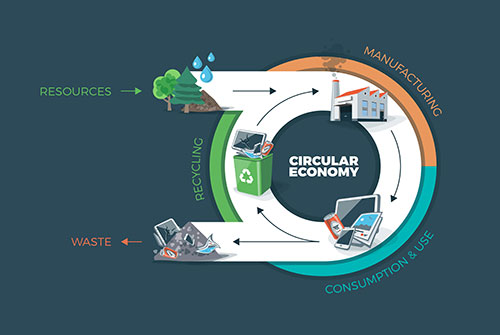- This topic is empty.
- AuthorPosts
- ሚያዝያ 14, 2025 at 5:35 ኤኤም #626449

As global agricultural practices evolve to meet the demands of a growing population and a changing climate, the emphasis on sustainability and resource efficiency has never been more critical. One forward-thinking approach gaining momentum is developing circular economy models for agricultural waste.
Instead of viewing waste as an endpoint, the circular economy reimagines it as a valuable input, closing resource loops and minimizing environmental impact. By designing systems that reuse, recycle, and regenerate, agriculture can become both more productive and more sustainable.
1. Rethinking Waste As A Resource
In traditional linear farming systems, agricultural waste—such as crop residues, manure, and food processing byproducts—is often discarded or underutilized. Circular economy models challenge this mindset by promoting the reuse and repurposing of these materials.
Waste is no longer seen as a problem to manage but as a raw material for new value chains. Whether through composting, bioenergy production, or feed conversion, recognizing the potential in agricultural byproducts is the first step toward a regenerative farming model.
2. Integrating Closed-Loop Nutrient Cycles
A key principle in developing circular economy models for agricultural waste is closing the nutrient loop. Instead of relying heavily on synthetic fertilizers, farms can return organic nutrients to the soil through composted plant matter, treated manure, or digestate from anaerobic digestion.
This approach not only reduces external inputs but also enhances soil health and fertility. Proper nutrient recycling minimizes runoff and pollution, protecting surrounding ecosystems and aligning with sustainable land management practices.
3. Leveraging Technology For Resource Efficiency
Digital tools and innovative technologies are central to making circular systems viable and efficient. Precision agriculture techniques can track nutrient flows and waste generation, enabling better decision-making around reuse and recycling.
Technologies like waste-to-energy systems, nutrient recovery units, and biorefineries allow farmers to extract maximum value from agricultural waste. With data-driven insights, farms can optimize resource use, reduce waste, and cut emissions—making circular systems practical and scalable.
4. Fostering Collaboration Across Value Chains
Circular agriculture doesn’t operate in isolation. It requires collaboration among farmers, processors, researchers, and policymakers. Partnerships with local industries or municipalities can open up new opportunities for shared resource recovery, such as co-digestion of food and farm waste or community composting systems.
Creating interconnected value chains ensures that agricultural waste flows back into the economy through different channels—whether as energy, fertilizers, packaging, or even textiles—strengthening regional sustainability efforts.
5. Building Economic And Environmental Resilience
Circular economy models not only protect the environment but also build farm resilience. By transforming waste into inputs or revenue-generating products, farms can reduce dependence on external resources and buffer against price fluctuations or supply chain disruptions.
Additionally, circular practices often align with consumer demand for eco-friendly and transparent food systems, opening up new market opportunities. Over time, these systems contribute to a more stable and sustainable agricultural economy.
Embracing sustainability requires a shift from linear to regenerative thinking, and developing circular economy models for agricultural waste is a powerful way to achieve that. By treating waste as a resource, closing nutrient loops, and leveraging technology and collaboration, farmers can turn environmental challenges into economic opportunities.
Circular models not only reduce the ecological footprint of agriculture but also pave the way for long-term productivity, profitability, and resilience in the face of global change.
Read Also: Waste Income
- AuthorPosts
- You must be logged in to reply to this topic.

